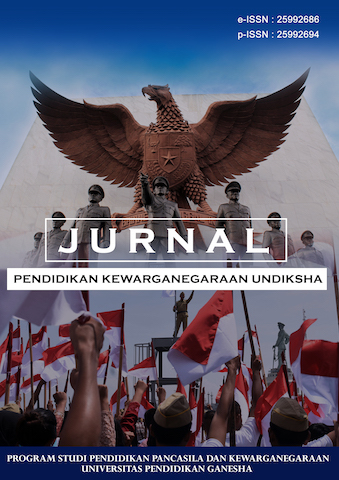INDONESIA OMNIBUS LAW: SUATU RESPON ATAS TANTANGAN KEDAULATAN EKONOMI INDONESIA SEBAGAI AKIBAT DARI PENGARUH TATA KELOLA REGULASI GLOBAL
Kata Kunci:
Omnibus Law, Economic Sovereignty, Global Regulations, Globalization, Good GovernanceAbstrak
This study aims to examine and analyze the influence of global regulatory governance on economic sovereignty in Indonesia. This type of research is normative legal research. This research is a descriptive qualitative research that describes the role of the Omnibus Law in responding to and facing the challenges of economic sovereignty in Indonesia. The writing of this article uses secondary legal materials, namely books, journals, articles, and other written works originating from both print and internet media, as well as phenomena that occur in the field. The results of the study show that, 1) There are still obstacles in the application of the Omnibus Law as the foundation for building Indonesia's economic sovereignty; 2) Good Governance system as an effort to build economic sovereignty in balancing global regulatory governance.
Referensi
Arifardhani, Y. (2020). Hukum Pasar Modal di Indonesia Dalam Perkembangan. Cet. 1. Jakarta: Prenada Media Group
Mangku, D. G. S. (2012). Suatu Kajian Umum tentang Penyelesaian Sengketa Internasional Termasuk di Dalam Tubuh ASEAN. Perspektif, 17(3).
Rahmah, M. (2019). Hukum Pasar Modal. Cet. 1. Jakarta: Prenada Media Group.
Undang-Undang Nomor 8 Tahun 1995 tentang Pasar Modal.
Yuliartini, N. P. R. (2016). Eksistensi Pidana Pengganti Denda Untuk Korporasi Dalam Pembaharuan Hukum Pidana Indonesia. Jurnal IKA, 14(1).
Yuliartini, N. P. R., & Mangku, D. G. S. (2020). Peran Dinas Tenaga Kerja Transmigrasi Kabupaten Buleleng Dalam Penempatan Dan Pemberian Perlindungan Hukum Tenaga Kerja Indonesia Di Luar Negeri. Jurnal Pendidikan Kewarganegaraan Undiksha, 8(2), 22-40.
Unduhan
Diterbitkan
Terbitan
Bagian
Lisensi

Artikel ini berlisensiCreative Commons Attribution-ShareAlike 4.0 International License.
Authors who publish with the Jurnal Pendidikan Kewarganegaraan Undiksha agree to the following terms:
- Authors retain copyright and grant the journal the right of first publication with the work simultaneously licensed under a Creative Commons Attribution License (CC BY-SA 4.0) that allows others to share the work with an acknowledgment of the work's authorship and initial publication in this journal.
- Authors are able to enter into separate, additional contractual arrangements for the non-exclusive distribution of the journal's published version of the work (e.g., post it to an institutional repository or publish it in a book), with an acknowledgment of its initial publication in this journal.
- Authors are permitted and encouraged to post their work online (e.g., in institutional repositories or on their website) prior to and during the submission process, as it can lead to productive exchanges, as well as earlier and greater citation of published work. (See The Effect of Open Access)










